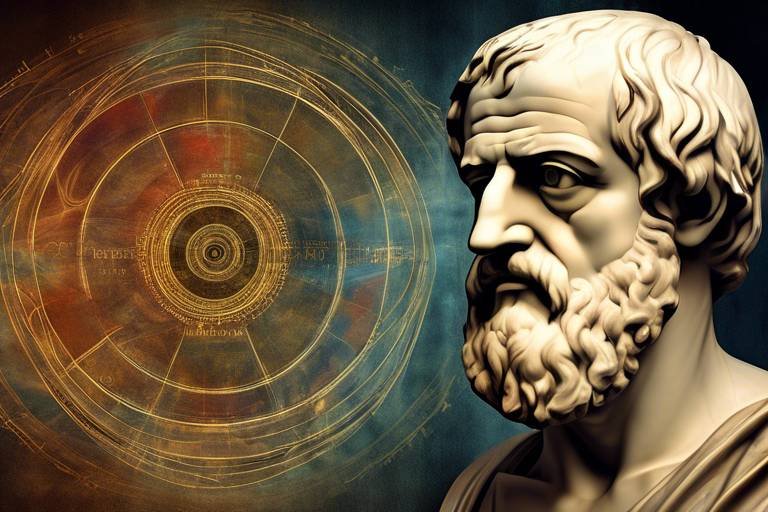The Philosophy of Laughter: Why Do We Laugh?
Laughter is one of those delightful mysteries of human existence that has puzzled philosophers, psychologists, and everyday folks alike. Why do we laugh? Is it merely a response to humor, or does it serve deeper purposes in our lives? This article embarks on an intriguing journey to explore the multifaceted nature of laughter, examining its psychological, social, and philosophical dimensions. As we dive into this exploration, we’ll uncover the reasons behind laughter and its significance in the tapestry of human experience. From the joyous bursts of laughter shared among friends to the quiet chuckles that arise during moments of introspection, laughter is a universal language that transcends barriers and connects us all.
Understanding the psychological mechanisms behind laughter reveals its role in emotional expression and mental health. Have you ever noticed how a good laugh can instantly lighten your mood? It’s not just a coincidence! Laughter triggers the release of endorphins, our body’s natural feel-good chemicals. This physiological response can serve as a powerful coping mechanism, helping us navigate through stress and anxiety. In fact, laughter can be so contagious that it often spreads like wildfire in social settings. When we laugh together, we create a shared experience that fosters joy and emotional connection. So, next time you find yourself giggling uncontrollably, remember that it’s not just about the humor; it’s about the emotional release and the joy it brings.
Laughter plays a crucial role in social bonding and communication. It’s like a secret handshake that instantly connects people, breaking down barriers and fostering a sense of belonging. When we laugh, we signal to others that we are approachable and friendly, creating an inviting atmosphere for interaction. This is particularly evident in group settings, where shared laughter can enhance group dynamics and strengthen relationships. By laughing together, we cultivate a sense of camaraderie that can be incredibly powerful. Think about it: have you ever felt closer to someone after sharing a hearty laugh? It’s as if laughter acts as a social lubricant, easing tensions and making conversations more enjoyable.
In social interactions, laughter serves as an essential tool for easing tensions and creating a more relaxed environment. Imagine walking into a room full of strangers; the air might feel thick with awkwardness. But then, someone cracks a joke, and suddenly, the atmosphere shifts. Laughter flows, and barriers dissolve. People begin to share their own stories, and connections form. This phenomenon isn’t limited to humor; even the mere act of laughing at oneself can disarm others and invite them to join in the fun.
Exploring laughter across various cultures highlights its universal appeal and differing meanings. While laughter is a common human experience, the contexts in which it arises can vary significantly. In some cultures, laughter may be a sign of joy and celebration, while in others, it might serve as a coping mechanism during difficult times. For instance, in certain Asian cultures, laughter may be more subdued in public settings, while in Western cultures, it often takes center stage in social gatherings. Understanding these cultural nuances enriches our appreciation for laughter and its role in human interaction.
Humor is a significant catalyst for laughter, acting as the spark that ignites our giggles and guffaws. However, the types of humor that elicit laughter can be incredibly diverse, ranging from slapstick to witty wordplay. Each person has their own unique sense of humor, shaped by their experiences, culture, and personality. This subjectivity adds an intriguing layer to the experience of laughter. What makes one person roar with laughter may leave another scratching their head in confusion. This diversity is what makes humor such a rich and fascinating subject to explore.
Research shows that laughter has numerous health benefits, including stress reduction and improved immune function. It’s like a natural medicine that requires no prescription! When we laugh, our bodies undergo a series of physiological changes that can positively impact our overall well-being. For example, laughter can increase blood flow, improve cardiovascular health, and even relieve pain by triggering the release of endorphins. So, the next time you find yourself in a fit of laughter, remember that you’re not just having fun; you’re also doing wonders for your health!
Delving into philosophical inquiries surrounding laughter prompts us to question its meaning and implications for human existence. What does laughter reveal about our nature? Is it a reflection of joy, suffering, or perhaps the absurdity of life itself? Philosophers have long debated the significance of laughter, pondering its role in our understanding of reality and our place within it. As we navigate through these philosophical waters, we find that laughter can serve as both a celebration of life’s joys and a poignant reminder of its inherent absurdities.
Exploring laughter through an existential lens reveals its connection to the human condition. In a world often filled with chaos and uncertainty, laughter can be both an affirmation of life and a challenge to our understanding of existence. It allows us to confront the absurdities of life with a sense of humor, reminding us that even in the darkest moments, there’s always room for a chuckle. This perspective invites us to embrace the complexities of life and find joy in the journey, even when the path seems uncertain.
Philosophically, laughter can reveal deeper truths about ourselves and society. It prompts us to reflect on our values, beliefs, and the nature of reality. When we laugh, we often expose the contradictions and absurdities inherent in our lives, challenging us to confront uncomfortable truths. This reflective aspect of laughter can lead to profound insights, encouraging us to question the status quo and explore new perspectives.
- What triggers laughter? Laughter can be triggered by various stimuli, including humor, social interactions, and even physical sensations.
- Is laughter contagious? Yes, laughter is highly contagious! Hearing someone laugh often makes others join in, creating a shared experience.
- Can laughter improve health? Absolutely! Laughter has been shown to reduce stress, improve immune function, and elevate mood.
- Does laughter have cultural differences? Yes, the expression and interpretation of laughter can vary significantly across different cultures.

The Psychology of Laughter
Laughter is more than just a spontaneous reaction; it’s a complex psychological phenomenon that plays a pivotal role in our emotional landscape. At its core, laughter serves as a universal language of joy, connecting us in ways that words often cannot. Have you ever noticed how a good laugh can lighten your mood, even on the toughest days? This is no coincidence! Research shows that laughter triggers the release of endorphins, our body's natural feel-good chemicals, which can lead to an immediate sense of happiness and well-being.
In the realm of psychology, laughter is often viewed as a coping mechanism. When faced with stress or adversity, many people turn to humor as a way to navigate their feelings. It’s like finding a silver lining in a cloud of chaos. For instance, during challenging times, sharing a laugh with friends can provide a much-needed emotional release, allowing individuals to momentarily escape their worries. This ability to laugh in the face of hardship not only fosters resilience but also strengthens social bonds, creating a support system that is vital for mental health.
Moreover, laughter can be a powerful indicator of emotional health. Those who laugh often tend to have a more positive outlook on life, which can significantly influence their interactions with others. Interestingly, laughter is not solely about humor; it can also stem from feelings of relief, joy, or even surprise. This multifaceted nature of laughter illustrates its role as a barometer of our emotional state, reflecting our inner experiences and reactions to the world around us.
To better understand the psychological underpinnings of laughter, consider the following points:
- Coping Mechanism: Laughter helps individuals deal with stress and anxiety, providing a momentary escape from difficult situations.
- Social Connection: Sharing laughter fosters a sense of belonging and strengthens relationships, making it easier to communicate and connect with others.
- Health Benefits: Regular laughter has been linked to improved immune function and reduced stress levels, contributing to overall well-being.
In summary, laughter is not merely a reaction; it is a vital aspect of our psychological health. It serves as a bridge connecting our emotions, our relationships, and even our physical health. By understanding the psychology behind laughter, we can appreciate its significance in our lives and harness its power to enhance our emotional resilience and social interactions.
- What triggers laughter? Laughter can be triggered by various stimuli, including jokes, funny situations, and even social interactions.
- Is laughter contagious? Yes, laughter is often contagious! Hearing someone laugh can evoke laughter in others, creating a shared experience.
- Can laughter improve mental health? Absolutely! Laughter can reduce stress, increase feelings of happiness, and improve overall mental health.

The Social Functions of Laughter
Laughter is not just a spontaneous reaction to something funny; it's a complex social tool that plays a pivotal role in human interactions. Think of laughter as a universal language that transcends barriers, uniting people from different backgrounds and cultures. When we laugh together, we create a sense of community and belonging, reinforcing social bonds and fostering connections. It's fascinating how a simple chuckle can transform a mundane conversation into a vibrant exchange filled with warmth and camaraderie.
At its core, laughter serves as a social lubricant, easing tensions and smoothing out the rough edges of communication. Imagine walking into a room filled with strangers; the initial awkwardness can be palpable. However, one hearty laugh can break the ice, allowing people to let their guards down and engage more openly. This is particularly important in settings like the workplace, where laughter can enhance teamwork and collaboration. In fact, studies have shown that teams that share laughter tend to be more productive and innovative. Why? Because laughter cultivates an environment where creativity can flourish, and individuals feel more comfortable sharing their ideas.
When we think about laughter as a social lubricant, it’s essential to recognize its ability to diffuse tension. Picture a heated debate; emotions are running high, and the atmosphere is thick with discomfort. A well-timed joke or a shared laugh can redirect the energy in the room, transforming conflict into connection. This phenomenon is not merely anecdotal; research supports the idea that laughter can lower stress levels and promote a more relaxed atmosphere. In social situations, laughter can create a sense of safety, allowing individuals to express themselves without fear of judgment.
Furthermore, laughter has a unique way of signaling acceptance. When we laugh with someone, we’re essentially saying, “I understand you, and I appreciate your company.” This shared experience of humor can help to forge connections that might not have existed otherwise. It's like a secret handshake that says, “We’re in this together.” The more we laugh together, the more we strengthen our social ties, leading to deeper relationships and a more robust support network.
Interestingly, the way laughter is perceived and expressed varies across cultures. In some societies, laughter is a sign of joy and happiness, while in others, it might be more nuanced, reflecting irony or even discomfort. For example, in cultures that value stoicism, laughter may be less frequent but can carry profound meaning when it occurs. Understanding these cultural differences enriches our appreciation for laughter as a social function. It highlights that while the act of laughing is universal, the contexts and meanings can differ significantly.
In essence, laughter is more than just a reaction; it’s a vital component of our social fabric. It helps us navigate the complexities of human relationships, providing a sense of connection and understanding. So, the next time you find yourself sharing a laugh, remember that you’re not just enjoying a moment of joy; you’re also participating in a powerful social ritual that strengthens bonds and enhances your overall well-being.
- Why do we laugh? Laughter serves as a response to humor, but it also plays a critical role in social bonding and emotional expression.
- Can laughter improve mental health? Yes! Laughter has been shown to reduce stress, anxiety, and depression, contributing to overall mental well-being.
- Is laughter universal? While everyone laughs, the context and interpretation of laughter can vary across different cultures.
- How does laughter affect relationships? Shared laughter can strengthen relationships, enhance communication, and create a sense of belonging.

Laughter as a Social Lubricant
Laughter is often described as the universal language of humanity, transcending barriers of culture, language, and even age. It serves as a powerful social lubricant, easing tensions and creating bonds between individuals. Imagine walking into a room full of strangers; the atmosphere can feel tense and awkward. However, a single laugh can break that ice, transforming the environment into one filled with warmth and camaraderie. This phenomenon isn't just coincidental; it’s deeply rooted in our psychology and social behavior.
When we laugh, our brains release a cocktail of neurotransmitters such as dopamine and endorphins, which not only elevate our mood but also foster a sense of connection with those around us. This biochemical reaction helps to create a shared experience that can bridge the gap between individuals. In a way, laughter acts like a glue, binding people together through shared joy and understanding. It’s fascinating how a simple chuckle can turn a mundane gathering into a memorable occasion.
Moreover, laughter can diffuse tension in potentially awkward situations. Think about it: have you ever found yourself in a heated discussion that suddenly lightened up with a well-timed joke? That moment of levity can shift the entire dynamic of a conversation, allowing participants to engage more openly and honestly. This ability to lighten the mood is essential in both personal relationships and professional settings, where communication can often become strained.
In fact, research has shown that teams that incorporate humor and laughter into their interactions tend to be more cohesive and productive. Laughter not only enhances cooperation but also encourages creativity, making it an invaluable tool in collaborative environments. It’s no wonder that many companies are now recognizing the importance of fostering a fun atmosphere to boost morale and productivity.
However, it’s important to note that the type of humor used can significantly influence its effectiveness as a social lubricant. For instance, self-deprecating humor can promote a sense of relatability, while playful teasing can strengthen bonds among friends. On the other hand, humor that alienates or belittles others can have the opposite effect, creating division rather than unity. Therefore, understanding the nuances of humor is crucial for harnessing laughter’s full potential in social interactions.
In conclusion, laughter is much more than just a response to something funny; it’s a vital component of human interaction that enriches our lives. It helps us navigate the complexities of social relationships, making connections deeper and more meaningful. So, the next time you find yourself in a social setting, don’t underestimate the power of laughter. It might just be the key to unlocking a world of connection and understanding.

Laughter is a universal language, transcending borders and cultures, yet it is also deeply rooted in the specific traditions and social norms of various societies. When we think about laughter, we often picture it as a spontaneous reaction to humor, but its significance goes far beyond mere amusement. In different cultures, laughter can symbolize joy, relief, and even a coping mechanism during tough times. For instance, in many African cultures, communal laughter is a vital part of storytelling, where the act of laughing together strengthens social bonds and fosters a sense of community.
Interestingly, the context in which laughter occurs can vary dramatically. In some Eastern cultures, laughter is often more subdued and can be seen as a sign of respect or humility, particularly in formal settings. On the other hand, Western cultures might embrace louder, more boisterous laughter as a sign of openness and friendliness. This divergence raises an intriguing question: how do these cultural nuances shape our understanding of humor and laughter?
Moreover, laughter can serve as a social barometer, reflecting societal values and beliefs. In Japan, for example, the concept of 'wa' (harmony) plays a critical role in social interactions. Here, laughter may be used to diffuse tension and maintain group harmony, whereas in other cultures, it might serve as a tool for challenging authority or expressing dissent. This complexity illustrates that laughter is not just a reaction; it's a cultural artifact that can reveal much about a society's dynamics and interpersonal relationships.
To further illustrate these cultural differences, consider the following table that highlights how laughter is perceived across various regions:
| Culture | Perception of Laughter | Social Context |
|---|---|---|
| African | Communal and joyous | Strengthens community ties |
| Japanese | Subdued and respectful | Maintains harmony in groups |
| American | Loud and expressive | Indicates openness and friendliness |
| Middle Eastern | Contextual and situational | Can express defiance or camaraderie |
As we delve deeper into the cultural tapestry of laughter, we find that it is not merely an expression of joy but a complex interplay of social cues, traditions, and emotional responses. Laughter can break down barriers, foster connections, and even serve as a bridge between differing worldviews. So, the next time you share a laugh with someone from a different culture, remember that you are participating in a rich, historical dialogue that spans across time and space.
- Why do we laugh? Laughter serves multiple purposes, including emotional expression, social bonding, and coping with stress.
- Is laughter universal? While the act of laughing is universal, the context and meaning behind laughter can vary greatly between cultures.
- Can laughter improve health? Yes, laughter has been shown to reduce stress, improve immune function, and enhance overall well-being.
- How does humor influence laughter? Different types of humor can elicit laughter in various ways, often shaped by personal and cultural preferences.

The Role of Humor in Laughter
When we think about laughter, it's almost impossible to separate it from humor. Humor serves as the spark that ignites the fire of laughter, transforming a mundane moment into an explosion of joy. But what is it about humor that tickles our funny bones and sends us into fits of giggles? The truth is that humor is a complex and multifaceted phenomenon, shaped by our personal experiences, cultural backgrounds, and even our psychological states.
At its core, humor is often defined as the quality of being amusing, but it goes far deeper than that. It’s a social glue that binds people together, creating shared experiences that foster connection. Think about it: when you share a laugh with someone, it’s more than just a fleeting moment of joy; it’s a bridge that strengthens your relationship. Whether it’s a clever pun, a witty observation, or a hilarious anecdote, humor has the power to dissolve barriers and create a sense of belonging.
Different types of humor can elicit different responses, and what makes one person laugh might leave another completely stone-faced. For instance, slapstick comedy relies on physical humor and visual gags, while satire uses irony and exaggeration to critique societal norms. Here’s a quick breakdown of some common types of humor and their characteristics:
| Type of Humor | Description | Example |
|---|---|---|
| Slapstick | Physical comedy that often involves exaggerated movements and situations. | Classic cartoons like Tom and Jerry. |
| Satire | Humor that critiques or mocks societal issues. | Shows like Saturday Night Live. |
| Wordplay | Humor that relies on clever use of language. | Puns and witty one-liners. |
| Dark Humor | Humor that finds comedy in topics usually considered serious or taboo. | Comedians like Anthony Jeselnik. |
In addition to its social functions, humor also serves a crucial psychological role. It can act as a coping mechanism, helping us navigate the challenges of life. When faced with adversity, humor allows us to reframe our experiences, making them more bearable. It’s like putting on a pair of comedic glasses that transform a bleak situation into something a little brighter.
Moreover, laughter triggered by humor releases endorphins, the brain's feel-good chemicals. This physiological response not only enhances our mood but also strengthens our immune system. So, the next time you find yourself laughing at a funny meme or a stand-up comedy special, remember that you’re not just having a good time; you’re also doing wonders for your mental and physical health.
In essence, humor is the lifeblood of laughter. It’s a dynamic interplay of wit, timing, and context that varies from person to person and culture to culture. Whether it’s a shared joke among friends or a clever quip in a crowded room, humor has the remarkable ability to connect us, heal us, and remind us of the joy that life can bring, even in its most absurd moments.
- What is the relationship between humor and laughter? Humor is the catalyst that triggers laughter, creating a joyful response to amusing situations or observations.
- Can laughter improve mental health? Yes, laughter can reduce stress, enhance mood, and promote a sense of well-being.
- Why do different people find different things funny? Humor is subjective and influenced by personal experiences, cultural background, and individual psychology.

Laughter isn’t just a spontaneous reaction to a funny joke; it’s a powerful tool for enhancing our well-being. In fact, research has shown that laughter can have a profound impact on both our physical and mental health. When we laugh, our bodies undergo a series of physiological changes that can lead to significant health benefits. For starters, laughter triggers the release of endorphins, the body’s natural feel-good chemicals. This not only elevates our mood but also promotes an overall sense of happiness and well-being.
Moreover, laughter can act as a natural stress reliever. When we laugh, our body relaxes, and this relaxation can last up to 45 minutes. It’s like a mini-vacation for our minds! Imagine you’re in a high-pressure meeting, and someone cracks a joke; that moment of laughter can diffuse tension and help you regain your focus. This is because laughter reduces the level of stress hormones like cortisol, making us feel more at ease.
But the health benefits of laughter don’t stop there. Studies have shown that laughter can improve cardiovascular health by increasing blood flow and improving the function of blood vessels. In essence, laughter is like a workout for your heart! It can even boost your immune system, making you less susceptible to illnesses. This is particularly important in today’s fast-paced world, where stress and anxiety can take a toll on our health.
Here’s a quick overview of some of the health benefits of laughter:
| Health Benefit | Description |
|---|---|
| Stress Reduction | Laughter decreases stress hormones, promoting relaxation. |
| Cardiovascular Health | Boosts blood circulation and improves heart function. |
| Immune System Boost | Enhances the immune response, making you less prone to illnesses. |
| Pain Relief | Releases endorphins that can help alleviate pain. |
Laughter also plays a role in social bonding, which is crucial for mental health. When we share a laugh with others, it strengthens our relationships and fosters a sense of community. This connection can lead to increased feelings of belonging and support, which are essential for our emotional well-being. So, the next time you find yourself laughing with friends, remember that it’s not just fun; it’s also good for your health!
In conclusion, laughter is a simple yet effective way to enhance our health and well-being. Whether it’s through watching a comedy, sharing a joke, or simply finding humor in everyday situations, incorporating laughter into our lives can lead to a happier, healthier existence. So go ahead, laugh it off – your body and mind will thank you!
- What are the psychological benefits of laughter? Laughter can help reduce stress, improve mood, and increase feelings of happiness and well-being.
- Can laughter really improve my physical health? Yes! Laughter can enhance cardiovascular health, boost the immune system, and even relieve pain.
- How can I incorporate more laughter into my life? Try watching comedies, spending time with funny friends, or engaging in activities that make you laugh.

The exploration of laughter through a philosophical lens invites us to ponder its profound implications for our existence. Laughter is not merely a spontaneous reaction to humor; it is a complex phenomenon that intertwines with our understanding of joy, suffering, and the absurdities of life. Have you ever found yourself laughing in the face of adversity? This reaction often serves as a coping mechanism, allowing us to confront the chaos of existence with a sense of levity. Philosophers have long debated whether laughter is a form of liberation or a reflection of our deeper struggles.
One compelling perspective is that laughter serves as a mirror, reflecting the truths of our human condition. When we laugh, we often reveal our vulnerabilities, our fears, and our shared experiences. This can be particularly evident in dark humor, where the juxtaposition of tragedy and comedy forces us to confront uncomfortable realities. In this sense, laughter becomes a tool for introspection, prompting us to question our values and beliefs. It challenges us to find meaning in the absurdity of life, as if to say, "If we can laugh at this, perhaps it isn't as dire as it seems."
Moreover, laughter can be seen as a philosophical inquiry into the nature of reality itself. The act of laughing at something absurd can lead us to a deeper understanding of our world. For instance, consider how satire uses humor to critique societal norms and injustices. By laughing at the absurdities of life, we can gain insights into our own beliefs and the constructs that shape our reality. This process can be both enlightening and unsettling, as it forces us to confront the contradictions inherent in our existence.
As we delve deeper into the philosophical dimensions of laughter, we can categorize its meanings into several key areas:
- Laughter and Joy: It symbolizes moments of happiness and connection, reinforcing the idea that joy can coexist with suffering.
- Laughter and Suffering: It can act as a balm for our wounds, allowing us to navigate through life's challenges with a lighter heart.
- Laughter and Absurdity: It highlights the absurd nature of existence, encouraging us to embrace the unpredictable elements of life.
In essence, laughter is a philosophical enigma that invites us to reflect on our existence. It challenges us to embrace the complexities of life, to find joy amidst suffering, and to recognize the absurdities that make us human. As we laugh, we are not just reacting to a moment of humor; we are engaging in a profound dialogue with ourselves and the world around us. This dialogue can lead to a deeper understanding of our place in the universe and the shared experiences that bind us together.
- What is the significance of laughter in philosophy?
Laughter is often seen as a reflection of our deeper truths and can challenge our understanding of joy and suffering. - Can laughter serve as a coping mechanism?
Yes, laughter can help individuals cope with adversity by providing a moment of relief and perspective. - How does laughter relate to absurdity?
Laughter can highlight the absurdities of life, prompting us to question our beliefs and values.

Laughter is often seen as a spontaneous reaction to humor, but when viewed through the lens of existentialism, it takes on a far deeper significance. Existentialism, with its focus on individual experience and the inherent absurdity of life, provides a unique framework for understanding why we laugh. At its core, laughter can be viewed as a response to the absurdity of existence itself. Just think about it: life is filled with unpredictable twists and turns, and sometimes the only way to cope with the chaos is to laugh. In this sense, laughter becomes a form of rebellion against the weight of existential dread.
When we laugh, we are not just expressing joy; we are also affirming our existence in a world that often seems nonsensical. This act of laughter serves as a reminder that despite life's challenges, we can find moments of levity. It's almost like a mental reset button, allowing us to step back and see the humor in our struggles. For instance, consider how comedians often draw on their personal experiences, turning pain and adversity into laughter. This transformation is not just entertaining; it's a profound statement about the human condition and our ability to find meaning in suffering.
Moreover, laughter can also challenge our understanding of life’s absurdities. It invites us to question our beliefs and values, prompting introspection about what truly matters. In a world that often prioritizes seriousness and productivity, laughter encourages us to embrace our imperfections and the unpredictability of life. It’s a gentle nudge to not take ourselves too seriously. Just as existentialists like Albert Camus suggested that we must confront the absurd, laughter offers a way to navigate through that confrontation with grace and humor.
In essence, laughter is a dual-edged sword in existential thought; it both affirms our existence and highlights the absurdity of our situation. It connects us to others, reminding us that we are not alone in our experiences. When we share a laugh, we acknowledge our shared human condition, making the existential journey a little less lonely. So, the next time you find yourself laughing, take a moment to appreciate the deeper layers of that laughter. It’s not just a reaction; it's a powerful expression of life itself.
- What is the connection between laughter and existentialism?
Laughter can be seen as a response to the absurdity of life, affirming our existence while also challenging our understanding of it. - How does laughter affect our mental health?
Laughter serves as a coping mechanism, helping to reduce stress and improve overall emotional well-being. - Can laughter bring people together?
Absolutely! Laughter fosters connections between individuals, enhancing social bonds and creating a sense of belonging.

Laughter is often seen as a spontaneous reaction to humor, but it can also serve as a profound reflection of truth, revealing deeper insights into our lives, society, and the human condition. When we laugh, we are not just expressing joy or amusement; we are also engaging in a complex dialogue with our inner selves and the world around us. This phenomenon is reminiscent of a mirror, reflecting not only our emotions but also the absurdities and contradictions of life. Have you ever found yourself laughing at something that, on the surface, seems tragic? This is where laughter becomes a tool for coping with the absurdity of existence, allowing us to confront uncomfortable truths with a light-hearted spirit.
Philosophically speaking, laughter can be a gateway to understanding our values and beliefs. It challenges the status quo and invites us to question the narratives we accept without hesitation. For instance, consider the humor found in satire; it highlights societal flaws and injustices, prompting us to reflect on our moral compass. In this sense, laughter can act as a catalyst for change, encouraging us to rethink our perspectives and engage in meaningful conversations. Moreover, the shared experience of laughter can forge connections among individuals, creating a sense of community around common truths.
In different cultures, laughter takes on various meanings, yet its essence as a reflection of truth remains consistent. Whether it’s a hearty laugh shared among friends or a chuckle at a poignant joke, laughter transcends boundaries and speaks to our shared humanity. It can expose the absurdities of social norms, revealing the underlying truths that often go unnoticed. This universality of laughter is what makes it such a powerful tool for connection and understanding.
To illustrate this point, let's consider the following table that outlines different cultural interpretations of laughter and its connection to truth:
| Cultural Context | Interpretation of Laughter | Truth Revealed |
|---|---|---|
| Western Cultures | Often associated with joy and humor | Life's challenges can be faced with a light heart |
| Eastern Cultures | Laughter as a means of social harmony | Community and connection are essential for happiness |
| African Cultures | Laughter as a form of storytelling | Truths about life and existence are shared through humor |
Ultimately, laughter serves as a powerful reminder that life is filled with contradictions. It invites us to embrace our imperfections and the absurdity of our existence. When we laugh, we acknowledge the complexity of life and our shared experiences, allowing us to find common ground with others. This reflection of truth through laughter not only enriches our understanding of ourselves but also encourages us to approach life with a sense of humor and resilience. So, the next time you find yourself laughing, take a moment to appreciate the deeper truths that may be lurking beneath the surface. After all, laughter is not just a reaction; it’s a profound commentary on the human experience.
- What is the psychological significance of laughter? Laughter can act as a coping mechanism, helping individuals deal with stress and enhance their emotional well-being.
- How does laughter foster social connections? Laughter serves as a social lubricant, easing tensions and creating bonds between individuals, thereby enhancing group dynamics.
- Can laughter have health benefits? Yes, research indicates that laughter can improve immune function, reduce stress, and promote overall physical health.
- What role does culture play in laughter? Cultural contexts shape how laughter is perceived and expressed, influencing its meanings and significance in different societies.
Frequently Asked Questions
-
What are the psychological benefits of laughter?
Laughter is more than just a response to humor; it serves as a powerful emotional release. It helps reduce stress, anxiety, and even depression. When we laugh, our brain releases endorphins, the body's natural feel-good chemicals, which can enhance our mood and overall sense of well-being.
-
How does laughter strengthen social bonds?
Laughter acts as a social glue, creating connections between people. When we share a laugh, it fosters a sense of belonging and community. It can break down barriers and ease tensions, making interactions more enjoyable and memorable. Think of laughter as the oil that keeps the gears of social interactions running smoothly!
-
Is laughter universal across cultures?
Yes, laughter is a universal human experience, but its meanings and expressions can vary widely across cultures. While the sound of laughter may be similar, the contexts in which we laugh and what triggers laughter can differ. This cultural diversity adds richness to our understanding of laughter and its significance in human interactions.
-
What role does humor play in eliciting laughter?
Humor is a significant catalyst for laughter, but what is funny to one person may not be to another. Different types of humor—be it slapstick, satire, or puns—can evoke laughter in unique ways. The subjective nature of humor means that our personal experiences and cultural backgrounds shape what makes us laugh.
-
Can laughter improve physical health?
Absolutely! Research indicates that laughter can lead to numerous health benefits, including improved immune function, reduced pain, and lower blood pressure. It's like a mini workout for your body; when you laugh, your heart rate increases, and you take in more oxygen, which can boost your overall health!
-
How does laughter relate to existential questions?
Laughter can be a profound response to the absurdities of life. From an existential perspective, it allows us to confront the complexities and challenges of existence with a sense of humor. It can affirm our experiences while also challenging our understanding of life's meaning, making it a unique lens through which to view our human condition.
-
Does laughter reveal truths about ourselves?
Yes, laughter often reflects deeper truths about our values, beliefs, and societal norms. It can serve as a mirror, prompting us to examine our perspectives and understand the world around us. In this way, laughter is not just a reaction; it can also be a tool for introspection and social commentary.



















